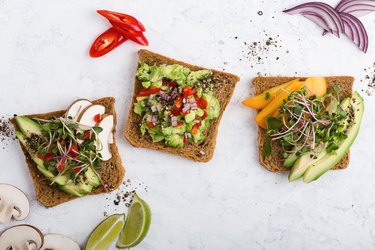
For decades, eating a low-fat diet was the recommended way to lose weight and improve heart health, according to the National Institutes of Health. The idea was to reduce saturated fats, not eliminate fat from the diet altogether. Eating no fat can negatively affect your health.
Tip
Eliminating fat from your diet altogether causes health problems and can lead to weight gain.
Video of the Day
Don't Risk Eating No Fat
Getting some fat in your diet is essential for good health. Fat provides the most energy-dense form of fuel for the body, as per the American Heart Association (AHA). Because it's so densely packed with energy — 9 calories per gram according to the USDA —it might be tempting to eliminate as much of the substance as possible from your daily meals or try to do without it altogether if you're trying to lose weight.
Video of the Day
However, the USDA Agricultural Research Service recommends getting at least 65 grams of fat if you're following a 2,000 calorie diet, or 80 grams of fat if you're on a 2,500-calorie diet. That means allocating 585 to 720 calories per day for fat. Although that can seem like a lot, that's less than 30 percent of your daily calorie budget. Only 10 percent of your fat budget should be from saturated fats, according to the USDA.
Unsaturated fats, such as oily fish, avocado and nuts help lower triglycerides and cholesterol, according to the AHA. They also compose part of your body's cell membranes, the phospholipid, which are vital to cell chemical signaling, according to the University of Virginia School of Medicine. Eating a variety of fats in the diet enables the cell to respond to various metabolic processes, including cellular protein production, inflammation and gene expression.
Not getting enough fat in your diet leads to essential fatty acid deficiency (EFAD). Fat deficiency symptoms include dry, scaly skin, brittle hair and itchy scalp. Your hair might begin to fade or go prematurely grey and you'll be more susceptible to infection and illness. Wounds heal much slower and kids can experience stunted growth.
Know You Could Gain Weight
Fat can help you feel full longer, as it takes longer to digest. When eliminating fat from the diet to lose weight, it's common to replace the slower-digesting fat with quickly digestible refined carbs, making you feel hungrier sooner, according to Harvard Health Publishing. Eventually, the diet fails, because you take in more food to keep your stomach feeling satisfied.
Reducing calories is what helps you lose weight, according to Harvard Health Publishing. However, if you're hungry all the time or craving essential fats that your body isn't getting, you're more likely to overeat carbohydrates and protein, taking in excess calories that end up as weight gain.
Instead of eliminating fat, eat a variety of whole, unprocessed foods such as those found on the Mediterranean diet, advises Harvard Health Publishing. Fruits, vegetables, whole grains and lean protein make up the bulk of the diet. Foods with healthy oils, such as nuts and oils, are also on the menu, as well as one or two glasses of wine per day, should you opt to include them.
- National Institutes of Health: News in Health: "The Skinny on Fat"
- American Heart Association: "Dietary Fats"
- USDA Agricultural Research Service: "Nutritive Value of Food"
- Harvard Health Publishing: "Diet and Weight Loss"
- USDA FoodData Central: "Oil"
- University of Virginia School of Medicine: "Essential Fatty Acid Deficiency"